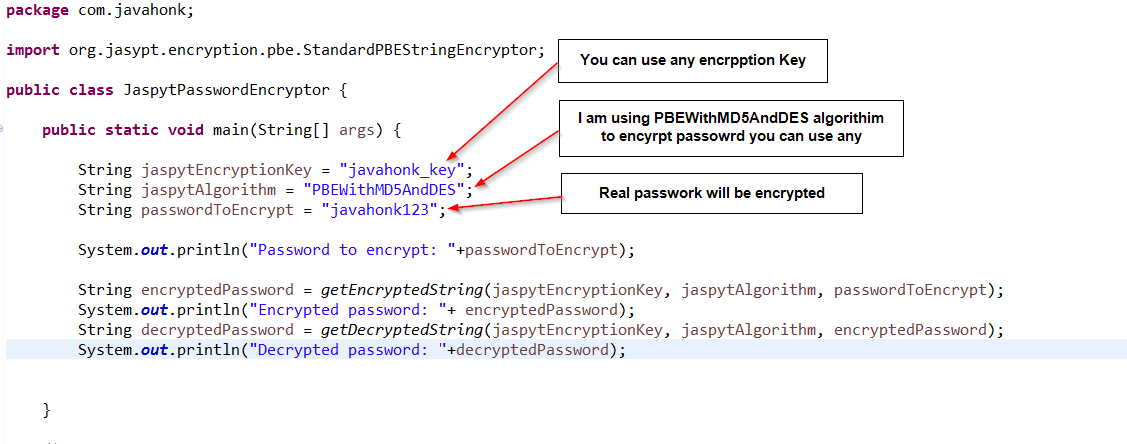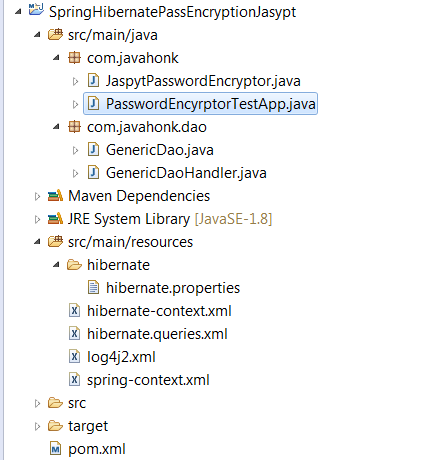Password Encryption Spring Hibernate Jasypt
In my previous tutorial you saw how to encrypt spring or hibernate application password without using any third party API. Today I will show you how to encrypt your application database properties using Jasypt Java library. Jasypt is a java library which provides basic encryption capabilities without putting much effort and of-course coding. As I don’t want to go to the shortcut route and show you only configuration part of Jasypt encryption. To better understand I will create sample Spring Hibernate application to show you how this works.
Tools needed:
- Eclipse 4.0 or above
- JDK 1.8
- Sybase 15.7 (You can use any database)
Steps:
- First create table using below script in Sybase database:
create table dbo.EquitySwapTest ( underlierRicCode varchar(20) null, underlierSmID int null, underlierCusip varchar(20) null, underlierAssetType varchar(20) null, div_list_id int null, eventDate int null ) on 'default'
- Insert some dummy data for test:
INSERT INTO OTC.dbo.EquitySwapTest( underlierRicCode ,underlierSmID ,underlierCusip ,underlierAssetType ,div_list_id ,eventDate ) VALUES ( 'underlierRicCode' ,12365 ,'underlierCusip' ,'underlierAssetType' ,1254 ,20151028 )
You can encrypt password using Jasypt utility which you download from here but that will take very long time so I have written custom class to encrypt passoword using StandardPBEStringEncryptor Jaypt API to use it. Please encrypt password using below class:
- JaspytPasswordEncryptor.java:
package com.javahonk;
import org.jasypt.encryption.pbe.StandardPBEStringEncryptor;
public class JaspytPasswordEncryptor {
public static void main(String[] args) {
String jaspytEncryptionKey = "javahonk_key";
String jaspytAlgorithm = "PBEWithMD5AndDES";
String passwordToEncrypt = "javahonk123";
System.out.println("Password to encrypt: "+passwordToEncrypt);
String encryptedPassword = getEncryptedString(jaspytEncryptionKey, jaspytAlgorithm, passwordToEncrypt);
System.out.println("Encrypted password: "+ encryptedPassword);
String decryptedPassword = getDecryptedString(jaspytEncryptionKey, jaspytAlgorithm, encryptedPassword);
System.out.println("Decrypted password: "+decryptedPassword);
}
/*
* Java services use the following:
* jaspytEncryptionKey:javahonk_key
* jaspytAlgorithm:PBEWithMD5AndDES
*/
public static String getEncryptedString(
String jaspytEncryptionKey,
String jaspytAlgorithm,
String passwordToEncrypt){
StandardPBEStringEncryptor encryptor = new StandardPBEStringEncryptor();
encryptor.setPassword(jaspytEncryptionKey);
encryptor.setAlgorithm(jaspytAlgorithm);
String encryptText = encryptor.encrypt(passwordToEncrypt);
return encryptText;
}
public static String getDecryptedString(
String jaspytEncryptionKey,
String jaspytAlgorithm,
String passwordToDecrypt){
StandardPBEStringEncryptor encryptor = new StandardPBEStringEncryptor();
encryptor.setPassword(jaspytEncryptionKey);
encryptor.setAlgorithm(jaspytAlgorithm);
String decryptText = encryptor.decrypt(passwordToDecrypt);
return decryptText;
}
}
- As you see above we are using below:
- Run this class as java application and in my case I got this encrypted password:
Important: To use this password just wrap it in the ENC “function” to tell Jasypt to decrypt it while application runs as below:
ENC(VRFGe5YeQmlnpDAYfQtKU+K/cPTuhU6r)
Now let’s complete project how this works:
- Create maven project name: SpringHibernatePassEncryptionJasypt and below is final project structure:
- Only important jar to encrypt password with Jasypt is to include below jar dependencies in your pom.xml:
<dependency> <groupId>org.jasypt</groupId> <artifactId>jasypt</artifactId> <version>1.9.2</version> </dependency> <dependency> <groupId>org.jasypt</groupId> <artifactId>jasypt-spring2</artifactId> <version>1.9.2</version> </dependency>
- pom.xml:
<project xmlns="http://maven.apache.org/POM/4.0.0" xmlns:xsi="http://www.w3.org/2001/XMLSchema-instance"
xsi:schemaLocation="http://maven.apache.org/POM/4.0.0 http://maven.apache.org/xsd/maven-4.0.0.xsd">
<modelVersion>4.0.0</modelVersion>
<groupId>com.javahonk</groupId>
<artifactId>SpringHibernatePassEncryptionJasypt</artifactId>
<version>0.0.1-SNAPSHOT</version>
<properties>
<project.build.sourceEncoding>UTF-8</project.build.sourceEncoding>
<maven.compiler.source>1.8</maven.compiler.source>
<maven.compiler.target>1.8</maven.compiler.target>
<apache.commons.lang.version>3.3.2</apache.commons.lang.version>
<commons.collections.version>3.2.1</commons.collections.version>
<commons.logging.version>1.2</commons.logging.version>
<org.apache.log4j.version>2.1</org.apache.log4j.version>
<objenesis.version>2.1</objenesis.version>
<cglib.version>3.2.0-SS</cglib.version>
<clusterAPI.version>1.0</clusterAPI.version>
<coherence.version>3.7</coherence.version>
<coherence-incubator.version>11.3.0</coherence-incubator.version>
<galaxy.version>v_10_0_20141003</galaxy.version>
<dom4j.version>1.6.1</dom4j.version>
<protobuf.version>2.6.1</protobuf.version>
<protoc-jar.version>2.6.1.3</protoc-jar.version>
<xercesImpl.version>unknown</xercesImpl.version>
<org.springframework.version>4.1.5.RELEASE</org.springframework.version>
<org.ow2.asm.version>5.0.3</org.ow2.asm.version>
<org.javassist.version>3.18.1-GA</org.javassist.version>
<org.jboss.logging.version>3.1.3.GA</org.jboss.logging.version>
<org.apache.geronimo.version>1.1.1</org.apache.geronimo.version>
<org.hibernate.core.version>4.3.9.Final</org.hibernate.core.version>
<org.hibernate.entitymanager.version>4.3.9.Final</org.hibernate.entitymanager.version>
<org.hibernate.annotations.version>4.0.5.Final</org.hibernate.annotations.version>
<org.hibernate.jpa.version>1.0.0.Final</org.hibernate.jpa.version>
<json-simple.version>1.1</json-simple.version>
<jasypt.version>1.9.2</jasypt.version>
<junit.version>4.12</junit.version>
</properties>
<dependencies>
<!-- JUNIT -->
<dependency>
<groupId>junit</groupId>
<artifactId>junit</artifactId>
<version>${junit.version}</version>
</dependency>
<!-- Spring -->
<!-- Core utilities used by other modules. Define this if you use Spring
Utility APIs (org.springframework.core.*/org.springframework.util.*) -->
<dependency>
<groupId>org.springframework</groupId>
<artifactId>spring-core</artifactId>
<version>${org.springframework.version}</version>
</dependency>
<!-- Expression Language (depends on spring-core) Define this if you use
Spring Expression APIs (org.springframework.expression.*) -->
<dependency>
<groupId>org.springframework</groupId>
<artifactId>spring-expression</artifactId>
<version>${org.springframework.version}</version>
</dependency>
<!-- Bean Factory and JavaBeans utilities (depends on spring-core) Define
this if you use Spring Bean APIs (org.springframework.beans.*) -->
<dependency>
<groupId>org.springframework</groupId>
<artifactId>spring-beans</artifactId>
<version>${org.springframework.version}</version>
</dependency>
<!-- Aspect Oriented Programming (AOP) Framework (depends on spring-core,
spring-beans) Define this if you use Spring AOP APIs (org.springframework.aop.*) -->
<dependency>
<groupId>org.springframework</groupId>
<artifactId>spring-aop</artifactId>
<version>${org.springframework.version}</version>
</dependency>
<!-- Application Context (depends on spring-core, spring-expression, spring-aop,
spring-beans) This is the central artifact for Spring's Dependency Injection
Container and is generally always defined -->
<dependency>
<groupId>org.springframework</groupId>
<artifactId>spring-context</artifactId>
<version>${org.springframework.version}</version>
</dependency>
<!-- Various Application Context utilities, including EhCache, JavaMail,
Quartz, and Freemarker integration Define this if you need any of these integrations -->
<dependency>
<groupId>org.springframework</groupId>
<artifactId>spring-context-support</artifactId>
<version>${org.springframework.version}</version>
</dependency>
<!-- JDBC Data Access Library (depends on spring-core, spring-beans, spring-context,
spring-tx) Define this if you use Spring's JdbcTemplate API (org.springframework.jdbc.*) -->
<dependency>
<groupId>org.springframework</groupId>
<artifactId>spring-jdbc</artifactId>
<version>${org.springframework.version}</version>
</dependency>
<!-- Object-to-Relation-Mapping (ORM) integration with Hibernate, JPA,
and iBatis. (depends on spring-core, spring-beans, spring-context, spring-tx)
Define this if you need ORM (org.springframework.orm.*) -->
<dependency>
<groupId>org.springframework</groupId>
<artifactId>spring-orm</artifactId>
<version>${org.springframework.version}</version>
</dependency>
<!-- Web application development utilities applicable to both Servlet and
Portlet Environments (depends on spring-core, spring-beans, spring-context)
Define this if you use Spring MVC, or wish to use Struts, JSF, or another
web framework with Spring (org.springframework.web.*) -->
<dependency>
<groupId>org.springframework</groupId>
<artifactId>spring-web</artifactId>
<version>${org.springframework.version}</version>
</dependency>
<!-- Support for testing Spring applications with tools such as JUnit and
TestNG This artifact is generally always defined with a 'test' scope for
the integration testing framework and unit testing stubs -->
<dependency>
<groupId>org.springframework</groupId>
<artifactId>spring-test</artifactId>
<version>${org.springframework.version}</version>
<scope>test</scope>
</dependency>
<!-- Spring Aspects -->
<dependency>
<groupId>org.springframework</groupId>
<artifactId>spring-aspects</artifactId>
<version>${org.springframework.version}</version>
</dependency>
<!-- Spring Tx -->
<dependency>
<groupId>org.springframework</groupId>
<artifactId>spring-tx</artifactId>
<version>${org.springframework.version}</version>
</dependency>
<dependency>
<groupId>com.oracle.coherence</groupId>
<artifactId>coherence</artifactId>
<version>${coherence.version}</version>
</dependency>
<dependency>
<groupId>com.wellsfargo.clusterAPI</groupId>
<artifactId>ClusterClient</artifactId>
<version>${clusterAPI.version}</version>
</dependency>
<dependency>
<groupId>com.wellsfargo.clusterAPI</groupId>
<artifactId>ClusterInfoInvocation</artifactId>
<version>${clusterAPI.version}</version>
</dependency>
<dependency>
<groupId>com.wellsfargo.galaxy</groupId>
<artifactId>attributes</artifactId>
<version>${galaxy.version}</version>
</dependency>
<dependency>
<groupId>com.wellsfargo.galaxy</groupId>
<artifactId>eqd</artifactId>
<version>${galaxy.version}</version>
</dependency>
<dependency>
<groupId>com.wellsfargo.galaxy</groupId>
<artifactId>eqdframework</artifactId>
<version>${galaxy.version}</version>
</dependency>
<dependency>
<groupId>com.oracle.coherence.incubator</groupId>
<artifactId>coherence-common</artifactId>
<version>${coherence-incubator.version}</version>
</dependency>
<dependency>
<groupId>com.oracle.coherence.incubator</groupId>
<artifactId>coherence-commandpattern</artifactId>
<version>${coherence-incubator.version}</version>
</dependency>
<dependency>
<groupId>com.oracle.coherence.incubator</groupId>
<artifactId>coherence-messagingpattern</artifactId>
<version>${coherence-incubator.version}</version>
</dependency>
<dependency>
<groupId>com.oracle.coherence.incubator</groupId>
<artifactId>coherence-processingpattern</artifactId>
<version>${coherence-incubator.version}</version>
</dependency>
<!-- dom4j -->
<dependency>
<groupId>dom4j</groupId>
<artifactId>dom4j</artifactId>
<version>${dom4j.version}</version>
</dependency>
<!-- xerces -->
<dependency>
<groupId>xerces</groupId>
<artifactId>xercesImpl</artifactId>
<version>${xercesImpl.version}</version>
</dependency>
<dependency>
<groupId>com.tunnelvisionlabs</groupId>
<artifactId>antlr4</artifactId>
<version>4.4</version>
<classifier>complete</classifier>
</dependency>
<!-- objenesis -->
<dependency>
<groupId>org.objenesis</groupId>
<artifactId>objenesis</artifactId>
<version>${objenesis.version}</version>
</dependency>
<!-- apache commons -->
<dependency>
<groupId>org.apache.commons</groupId>
<artifactId>commons-lang3</artifactId>
<version>${apache.commons.lang.version}</version>
</dependency>
<!-- commons-io -->
<dependency>
<groupId>commons-io</groupId>
<artifactId>commons-io</artifactId>
<version>2.4</version>
</dependency>
<!-- commons collections -->
<dependency>
<groupId>commons-collections</groupId>
<artifactId>commons-collections</artifactId>
<version>${commons.collections.version}</version>
</dependency>
<!-- commons logging -->
<dependency>
<groupId>commons-logging</groupId>
<artifactId>commons-logging</artifactId>
<version>${commons.logging.version}</version>
</dependency>
<!-- cglib -->
<dependency>
<groupId>cglib</groupId>
<artifactId>cglib</artifactId>
<!--<version>3.1</version> -->
<version>${cglib.version}</version>
</dependency>
<!-- jdbc driver -->
<dependency>
<groupId>com.sybase.jdbcx</groupId>
<artifactId>jconn4</artifactId>
<version>7.07</version>
</dependency>
<!-- aop alliance -->
<dependency>
<groupId>aopalliance</groupId>
<artifactId>aopalliance</artifactId>
<version>1.0</version>
</dependency>
<!-- asm -->
<dependency>
<groupId>org.ow2.asm</groupId>
<artifactId>asm</artifactId>
<version>${org.ow2.asm.version}</version>
</dependency>
<!-- javassist -->
<dependency>
<groupId>org.javassist</groupId>
<artifactId>javassist</artifactId>
<version>${org.javassist.version}</version>
</dependency>
<!-- jboss logging -->
<dependency>
<groupId>org.jboss.logging</groupId>
<artifactId>jboss-logging</artifactId>
<version>${org.jboss.logging.version}</version>
</dependency>
<!-- hibernate -->
<dependency>
<groupId>org.hibernate</groupId>
<artifactId>hibernate-core</artifactId>
<version>${org.hibernate.core.version}</version>
</dependency>
<dependency>
<groupId>org.hibernate</groupId>
<artifactId>hibernate-entitymanager</artifactId>
<version>${org.hibernate.entitymanager.version}</version>
</dependency>
<dependency>
<groupId>org.hibernate.common</groupId>
<artifactId>hibernate-commons-annotations</artifactId>
<version>${org.hibernate.annotations.version}</version>
</dependency>
<dependency>
<groupId>org.hibernate.javax.persistence</groupId>
<artifactId>hibernate-jpa-2.1-api</artifactId>
<version>${org.hibernate.jpa.version}</version>
</dependency>
<dependency>
<groupId>com.googlecode.json-simple</groupId>
<artifactId>json-simple</artifactId>
<version>${json-simple.version}</version>
</dependency>
<!-- Log4j -->
<dependency>
<groupId>org.apache.logging.log4j</groupId>
<artifactId>log4j-api</artifactId>
<version>${org.apache.log4j.version}</version>
</dependency>
<dependency>
<groupId>org.apache.logging.log4j</groupId>
<artifactId>log4j-core</artifactId>
<version>${org.apache.log4j.version}</version>
</dependency>
<dependency>
<groupId>org.jasypt</groupId>
<artifactId>jasypt</artifactId>
<version>${jasypt.version}</version>
</dependency>
<dependency>
<groupId>org.jasypt</groupId>
<artifactId>jasypt-spring2</artifactId>
<version>${jasypt.version}</version>
</dependency>
</dependencies>
</project>- spring-context.xml:
<?xml version="1.0" encoding="UTF-8"?> <beans xmlns="http://www.springframework.org/schema/beans" xmlns:xsi="http://www.w3.org/2001/XMLSchema-instance" xmlns:context="http://www.springframework.org/schema/context" xmlns:jdbc="http://www.springframework.org/schema/jdbc" xmlns:tx="http://www.springframework.org/schema/tx" xmlns:util="http://www.springframework.org/schema/util" xsi:schemaLocation="http://www.springframework.org/schema/beans http://www.springframework.org/schema/beans/spring-beans.xsd http://www.springframework.org/schema/context http://www.springframework.org/schema/context/spring-context-4.1.xsd http://www.springframework.org/schema/jdbc http://www.springframework.org/schema/jdbc/spring-jdbc-4.1.xsd http://www.springframework.org/schema/tx http://www.springframework.org/schema/tx/spring-tx-4.1.xsd http://www.springframework.org/schema/util http://www.springframework.org/schema/util/spring-util-4.1.xsd"> <context:annotation-config /> <context:component-scan base-package="com.javahonk.dao, com.javahonk.model" /> <bean class="org.jasypt.spring.properties.EncryptablePropertyPlaceholderConfigurer"> <constructor-arg ref="encryptor" /> <property name="locations"> <list> <value>classpath:hibernate/hibernate.properties</value> </list> </property> <property name="ignoreUnresolvablePlaceholders" value="true"/> <property name="ignoreResourceNotFound" value="true"/> </bean> <bean id="encryptor" class="org.jasypt.encryption.pbe.StandardPBEStringEncryptor"> <property name="algorithm" value="PBEWithMD5AndDES" /> <property name="password" value="javahonk_key" /> </bean> <import resource="hibernate-context.xml"/> </beans>
- log4j2.xml:
<?xml version="1.0" encoding="UTF-8"?>
<Configuration status="INFO" shutdownHook="disable">
<Properties>
<Property name="envrionment.target">DEV</Property>
</Properties>
<Properties>
<Property name="logging.dir">./</Property>
</Properties>
<Appenders>
<Console name="Console" target="SYSTEM_OUT">
<PatternLayout pattern="%d{HH:mm:ss.SSS} [%t] %-5level %logger{36} - %msg%n" />
</Console>
<RollingFile name="RollingFile"
fileName="./logs/rolling-file.log" filePattern="${sys:logging.dir}/logs/rolling-file-%d{yyyy-MM-dd}-%i.log">
<PatternLayout pattern="%d{HH:mm:ss.SSS} [%t] %-5level %logger{36} - %msg%n" />
<!-- TODO:Change to time based policy -->
<Policies>
<TimeBasedTriggeringPolicy interval="1" modulate="true" />
<SizeBasedTriggeringPolicy size="100 MB" />
</Policies>
<DefaultRolloverStrategy max="4" />
</RollingFile>
</Appenders>
<Loggers>
<Root level="info">
<AppenderRef ref="Console" />
<!-- <AppenderRef ref="file" /> -->
<AppenderRef ref="RollingFile" />
</Root>
</Loggers>
</Configuration>
- hibernate.querites.xml: For this demo we are not using any query and if you want you can utilize it:
<?xml version="1.0" encoding="UTF-8"?> <!DOCTYPE hibernate-mapping PUBLIC "-//Hibernate/Hibernate Mapping DTD 3.0//EN" "http://www.hibernate.org/dtd/hibernate-mapping-3.0.dtd" > <hibernate-mapping> </hibernate-mapping>
- hibernate-context.xml:
<?xml version="1.0" encoding="UTF-8"?>
<beans xmlns="http://www.springframework.org/schema/beans"
xmlns:xsi="http://www.w3.org/2001/XMLSchema-instance"
xmlns:context="http://www.springframework.org/schema/context"
xmlns:jdbc="http://www.springframework.org/schema/jdbc"
xmlns:tx="http://www.springframework.org/schema/tx"
xmlns:util="http://www.springframework.org/schema/util"
xsi:schemaLocation="http://www.springframework.org/schema/beans http://www.springframework.org/schema/beans/spring-beans.xsd
http://www.springframework.org/schema/context http://www.springframework.org/schema/context/spring-context-4.1.xsd
http://www.springframework.org/schema/jdbc http://www.springframework.org/schema/jdbc/spring-jdbc-4.1.xsd
http://www.springframework.org/schema/tx http://www.springframework.org/schema/tx/spring-tx-4.1.xsd
http://www.springframework.org/schema/util http://www.springframework.org/schema/util/spring-util-4.1.xsd">
<context:component-scan base-package="com.javahonk.dao, com.javahonk.model" />
<tx:annotation-driven transaction-manager="transactionManager" />
<bean id="dataSource" class="org.springframework.jdbc.datasource.DriverManagerDataSource">
<property name="driverClassName" value="${jdbc.driverClassName}" />
<property name="url" value="${jdbc.url}" />
<property name="username" value="${jdbc.username}" />
<property name="password" value="${jdbc.password}" />
</bean>
<bean id="sessionFactory" class="org.springframework.orm.hibernate4.LocalSessionFactoryBean">
<property name="dataSource" ref="dataSource" />
<property name="packagesToScan">
<list>
<value>com.javahonk.model</value>
<value>com.javahonk.dao</value>
</list>
</property>
<property name="hibernateProperties">
<props>
<prop key="hibernate.dialect">${hibernate.dialect}</prop>
<prop key="hibernate.show_sql">${hibernate.show_sql}</prop>
<prop key="hibernate.c3p0.max_size">${hibernate.c3p0.max_size}</prop>
<prop key="hibernate.c3p0.min_size">${hibernate.c3p0.min_size}</prop>
<prop key="hibernate.c3p0.timeout">${hibernate.c3p0.timeout}</prop>
<prop key="hibernate.c3p0.max_statements">${hibernate.c3p0.max_statements}</prop>
</props>
</property>
<property name="mappingLocations" value="hibernate.queries.xml"></property>
</bean>
<bean id="transactionManager" class="org.springframework.orm.hibernate4.HibernateTransactionManager">
<property name="sessionFactory" ref="sessionFactory"/>
</bean>
</beans>- hibernate.properties:
jdbc.driverClassName=com.sybase.jdbc4.jdbc.SybDriver default_streamed_object_size=5000 default_max_query_size=1000 jdbc.url=jdbc:sybase:Tds:javahonk.com:12000 jdbc.username=javahonk jdbc.password=ENC(VRFGe5YeQmlnpDAYfQtKU+K/cPTuhU6r) hibernate.dialect=org.hibernate.dialect.SybaseASE157Dialect hibernate.show_sql=false hibernate.jdbc.lob.non_contextual_creation=true c3p0.acquireIncrement=2 c3p0.maxPoolSize=10 c3p0.minPoolSize=1 c3p0.maxIdleTime=1800
- GenericDao.java:
package com.javahonk.dao;
import java.util.List;
public interface GenericDao<T> {
public List<T> getEquitySwapByHibernateQuery(int eventDate);
}
- GenericDaoHandler.java:
package com.javahonk.dao;
import java.util.List;
import org.hibernate.Query;
import org.hibernate.Session;
import org.hibernate.SessionFactory;
import org.springframework.beans.factory.annotation.Autowired;
import org.springframework.stereotype.Repository;
import org.springframework.transaction.annotation.Transactional;
@Repository
@Transactional
public class GenericDaoHandler<T> implements GenericDao<T>{
@Autowired
private SessionFactory sessionFactory;
@SuppressWarnings("unchecked")
@Override
public List<T> getEquitySwapByHibernateQuery(int eventDate) {
Session session = sessionFactory.getCurrentSession();
Query query = session.createSQLQuery("SELECT * FROM OTC.dbo.EquitySwapTest where eventDate = :eventDate");
query.setParameter("eventDate", eventDate);
List<T> dividendPayDate = query.list();
return dividendPayDate;
}
}
- PasswordEncyrptorTestApp.java: To test the application:
package com.javahonk;
import java.util.List;
import org.apache.logging.log4j.LogManager;
import org.apache.logging.log4j.Logger;
import org.springframework.context.ApplicationContext;
import org.springframework.context.support.AbstractApplicationContext;
import org.springframework.context.support.ClassPathXmlApplicationContext;
import com.javahonk.dao.GenericDao;
public class PasswordEncyrptorTestApp {
private static final Logger logger = LogManager.getLogger(PasswordEncyrptorTestApp.class.getName());
public static void main(String[] args) {
logger.info("Starting HibernateTestApp...");
ApplicationContext context = new ClassPathXmlApplicationContext("spring-context.xml");
GenericDao<?> genericDao = context.getBean(GenericDao.class);
List<?> dataList2 = genericDao.getEquitySwapByHibernateQuery(20151028);
logger.info("Got the data: {}", dataList2);
((AbstractApplicationContext) context).close();
}
}
To test this application right click PasswordEncyrptorTestApp.java –> Run As –> Java Application and if everything setup correctly you will see below output:
12:41:54.408 [main] INFO com.javahonk.PasswordEncyrptorTestApp - Got the data: [[underlierRicCode, 12365, underlierCusip, underlierAssetType, 1254, 20151028], [underlierRicCode, 12365, underlierCusip, underlierAssetType, 1254, 20151028], [underlierRicCode, 12365, underlierCusip, underlierAssetType, 1254, 20151028], [underlierRicCode, 12365, underlierCusip, underlierAssetType, 1254, 20151028], [underlierRicCode, 12365, underlierCusip, underlierAssetType, 1254, 20151028], [underlierRicCode, 12365, underlierCusip, underlierAssetType, 1254, 20151028], [underlierRicCode, 12365, underlierCusip, underlierAssetType, 1254, 20151028], [underlierRicCode, 12365, underlierCusip, underlierAssetType, 1254, 20151028]]
For more information on Jasypt encryption please visit its official site here
![]() Download Project: SpringHibernatePassEncryptionJasypt
Download Project: SpringHibernatePassEncryptionJasypt




Thanks its really helpful
Very useful resource. Thanks. 🙂